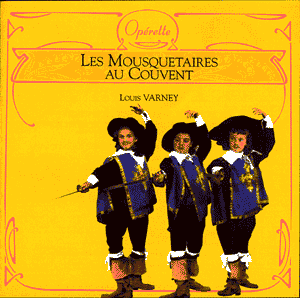This
set is from the Universal France/Accord series of 1950s-1960s
re-releases.
Louis
Varney as a composer of operetta following on the heels of
Offenbach who had popularised opéra comique for the previous
two decades. As a name he is forgotten now yet in his day he composed
a number of successful opéra comiques, of which Les
Mousquetaires au Couvent is the most celebrated. Varney's
father was a small time composer as well as conductor for the
Bouffes Parisiens, a theatre noted for its light musical entertainment.
A young Varney helped the director there (Louis Cantin) in setting
up some of his productions. Cantin suggested that he write an
operetta based on an early vaudeville by Saint-Hilaire and Duport
called The Habit doesn’t make the Monk (1835). This was
to become The Musketeers in the Convent, which is picturesquely
set in Louis XIII's reign. In its funny libretto, two musketeers
disguise themselves as monks. (A similar comical device would
be used five years later in Princess Ida by Gilbert and
Sullivan.) The plot is cleverly contrived and helped give this
work an immediate success, so much so that the production saved
the closure of the theatre. The other Varney operatic works sadly
died with him and the titles that followed, Fanfan la Tulipe
(1882) or his last work, L’Age d’Or (1905), are not known
today.
I
find Varney's music romantically charming where the first violins
dance along with the melody line. It is not far removed from the
familiar formula of Offenbach with maybe a touch of Rossini. There
are not particularly memorable tunes like those found in Orpheus
or Belle Hélène, but what Varney lacks here
he amply makes up with effective chorus numbers. The score is
lively, full of colour and rhythm.
From
the moment when the curtain rises one's attention is assured [CD1
tk.2]. Try the breezy trio [CD2 tk.2] or laughing chorus of Act
III [CD2 tk.16]. The entr’acte to Act 2 is based on the captivating
waltz tune first heard in an Act 1 chorus number. The Act 3 Offenbachian-style
entr’acte is particularly charming. The energetic pace provided
by Benedetti gives a zippy feel to the music.
The
role of Simone is played by Colette Riedinger: with a good 'top'
and pleasant coloratura, she has a habit of unnecessaily exaggerating
certain notes. This provides a shrillness in her delivery and
in CD1 tk.12 seems to be linked with a lack of breath control.
The men are more secure and good performances are given by Louis
Musy, Gabriel Bacquier and in particular Pierre Blanc. His light
lyrical singing helps lift the piece. The chorus work is not always
crisply delivered, but this does not detract from one's enjoyment.
Brief
notes in French are provided in the attractive card case. It would
have been nice to have the track list showing which characters
deliver the dialogue.
Raymond
Walker
Operette
series from Universal Accord reviewed
by Ray Walker
Other
sets in the Accord 'Operette' series:
Audran,
La Mascotte [465 877-2];
Benatzky,
L'Auberge du Cheval Blanc [465 880-2];
Christiné,
Dédé [461 961-2] Phi-Phi [465 886-2];
Dumas,
Ignace [472 877-2];
Ganne,
Les Saltimbanques [465 868-2];
Goulblier,
La Cocarde de Mimi Pinson [461 964-2];
Lecocq,
La Fille de Madame Angot [465 883-2] Le Petit Duc [472
874-2]; Lehár, Paganini [472 868-2] Rose de Noel
[472 871-2];
Maillart,
Les Dragons de Villars [472 865-2];
Messager,
Véronique [465 864-2];
Offenbach,
La Belle Hélène [461 954-2] La Fille du
Tambour Major [461 673-2] La Grande Duchesse de Gérolstein
[465 871-2];
Planquette,
Les Cloches de Corneville [465 861-2];
J
Strauss, Trois Valses [461 958-2];
Yvain,
La-Haut [461 967-2].
Further
reading: "Operetta", Traubner (Oxford 2003); ‘Musicals",
Ganzl (Carlton 1995)
